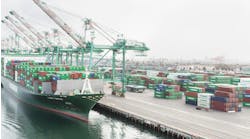Supply Chain Woes are Keeping Global Execs Up at Night
Download this article in PDF format.
In an era where uncertainty has become the “new normal,” supply chain operators are facing a host of new and emerging challenges this year. From geopolitical tensions and natural disasters to economic downturns and evolving consumer demands, the modern supply chain operates in a constant state of flux. Successfully navigating this landscape requires agility, resilience and a proactive risk management approach.
“As we enter 2025, executives are at a pivotal moment in the global supply chain landscape with near-term uncertainties in the economy and geopolitics set against the long-term need to incorporate technology and meet sustainability goals,” Prologis Research states in a new supply chain intelligence report. “Leaders are losing sleep over supply chain issues, how to invest and what to prioritize to stay ahead of the competition.”
66% of Execs are Worried About their Supply Chains
Working with The Harris Poll, Prologis Research (the in-house research and analytics arm of Prologis, which owns and develops logistics real estate) surveyed more than 1,000 executives in the U.S., UK and Germany. Most of the executives (66%) say supply chain concerns are keeping them up at night right now.
“Global supply chains face an unmatched ‘polycrisis,’ a web of challenges that span geopolitical tensions, economic instability, shifting regulatory pressures, fluctuating customer demands and pressing climate challenges,” Prologis Research points out. “This crisis is compelling businesses to develop more flexible strategies to navigate constant disruption.”
According to the survey, 86% of executives are worried about how economic instability and geopolitical pressures are impacting their organizations’ supply chain decisions. “We’re prioritizing robust strategies to ensure that our operations can withstand the next black swan event,” and so are 87% of business executives,” says Ninaad Acharya, CEO at Fulfillment IQ. “The goal is to ensure business continuity through agile, adaptable operations that can respond quickly to unexpected, rare, but potentially catastrophic, events.”
And speaking of black swan events—those unpredictable and highly improbable events that have significant and far-reaching impacts—the survey found that 87% of executives are currently prioritizing strategies that safeguard against these incidents.
Better Tools Needed
Despite heightened awareness of supply chain vulnerabilities, Prologis Research says many organizations remain underprepared. Only about 40% of executives feel their organizations have the tools, resources and strategies to tackle such challenges as cybersecurity attacks, technological disruptions and regulatory changes.
“Preparedness drops even further for issues like geopolitical instability, trade wars and climate crises, highlighting significant vulnerabilities,” it says. “Lack of preparedness doesn’t just heighten risk: It directly compromises organizational performance and the ability to adapt to unforeseen disruptions.”
Focused on Greener Supply Chains
Most executives (71%) are feeling the pressure to transition to using more renewable sources.
In response to escalating climate concerns, intensifying regulatory pressures and rapidly evolving consumer and investor expectations, Prologis Research says executives are reexamining plans and taking decisive actions to make operations more sustainable.
“Recent disruptions highlight the need to transition to alternative energy sources,” it adds. “Businesses also need to comply with new regulations and want to save on operational costs.”
The company says 80% of executives cite unclear return on investment (ROI) as a major roadblock in allocating resources to green initiatives. Also, 72% of executives admit their current sustainability efforts have fallen short of corporate objectives.
“Despite the hurdles, 87% of executives plan to increase investments in sustainable supply chain practices when financial pressures ease,” Prologis Research reports. “In fact, 88% of executives not only express a genuine desire to incorporate sustainability into their supply chains but also care personally about their organization’s long-term sustainability goals.”








